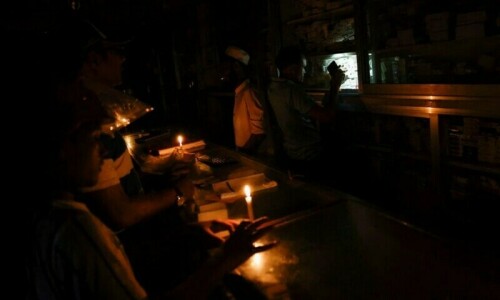WASHINGTON: The war in Iraq and other foreign affairs are more important to voters in the coming presidential election than the economy, marking the first time since the Vietnam era that US citizens are putting more weight on foreign policy than domestic concerns, according to a poll released on Wednesday.
Forty-one per cent of voting-age adults rated 'war, foreign policy and terrorism' the most important problems facing the nation, concluded the survey released by the Pew Research Centre (PRC) in association with the Council on Foreign Relations (CFR), an established, Washington- based think tank.
Economic issues topped the concerns of 26 per cent of respondents while the same number chose 'other domestic issues,' added the survey. "The Sept 11 attacks and the two wars that followed not only have raised the stakes for voters as they consider their choice for president, but also have created deep divisions and conflicting sentiments over US foreign policy in a troubled time," said a PRC statement.
The poll found that nearly as many respondents favoured a 'decisive foreign policy' (62 per cent) as supported a cautious approach (66 per cent). And reflecting a growing partisan gap on foreign policy sentiment, Republican voters, from the party of President George W. Bush, assign higher priority to decisiveness than to caution, while Democrats do the opposite.
The survey was conducted on July 8-18 among 2,009 adults across the United States. A narrow majority of respondents, 53 per cent, still believe it was the 'right decision' to use military force in Iraq, but the number has dropped from the 74 per cent who held that view after the US-led attack in March 2003.
In a related field, 52 per cent of respondents said they disapproved with how the Bush administration has handled the situation in Iraq, while 43 per cent continue to approve of its actions there.
In a follow-up poll conducted August 5-10 among 1,512 adults, the PRC found that, more than a month after the transfer of sovereignty to an interim Iraqi government, 58 per cent of respondents said Bush does not have a clear plan for bringing the situation in Iraq to a successful conclusion.
Presumably in response to the ongoing quagmire in Iraq, a solid 59 per cent of respondents, in the July foreign policy survey, faulted the administration for being too quick to use force as a foreign policy tool rather than trying to reach diplomatic solutions.
Since May 2003 the number of respondents who 'sometimes' support pre-emptive military action had sunk from 45 per cent to 40 per cent, the survey found. In the ongoing Israeli-Palestinian conflict, public sympathies still lie predominantly with Israel, by a margin of 40 per cent to 13 per cent, but there has been a noticeable decline in the percentage of Americans who regard US policies in the Middle East as 'fair' - 35 per cent, down from 47 per cent in May 2003.
The poll found respondents clearly aware of the loss of respect for the United States internationally as a result of recent foreign policy decisions, with two-thirds saying the country is less respected by other countries than in the past.
"The fact that two-thirds of US citizens say the US is less respected in the world is highly significant," said PRC Editor Carroll Doherty in an interview with IPS. However, heightened awareness of the threat of terrorism resulted in 88 per cent of respondents rating "taking measures to protect the United States from terrorist attacks" as a "top foreign policy priority."
Fifty-one per cent of Democrats believed US wrong doings in dealing with other countries might have motivated the Sept 11, 2001, terrorist attacks while a majority, 76 per cent, of Republicans rejected that notion.
When asked to rank national priorities, Democrats placed creating and protecting jobs in the United States as their highest priority, followed by combating terrorism and slowing the spread of AIDS.
Republicans made fighting terrorism the highest priority, followed by preventing the spread of weapons of mass destruction and creating and protecting US jobs. -Dawn/The Inter Press News Service.














































Dear visitor, the comments section is undergoing an overhaul and will return soon.